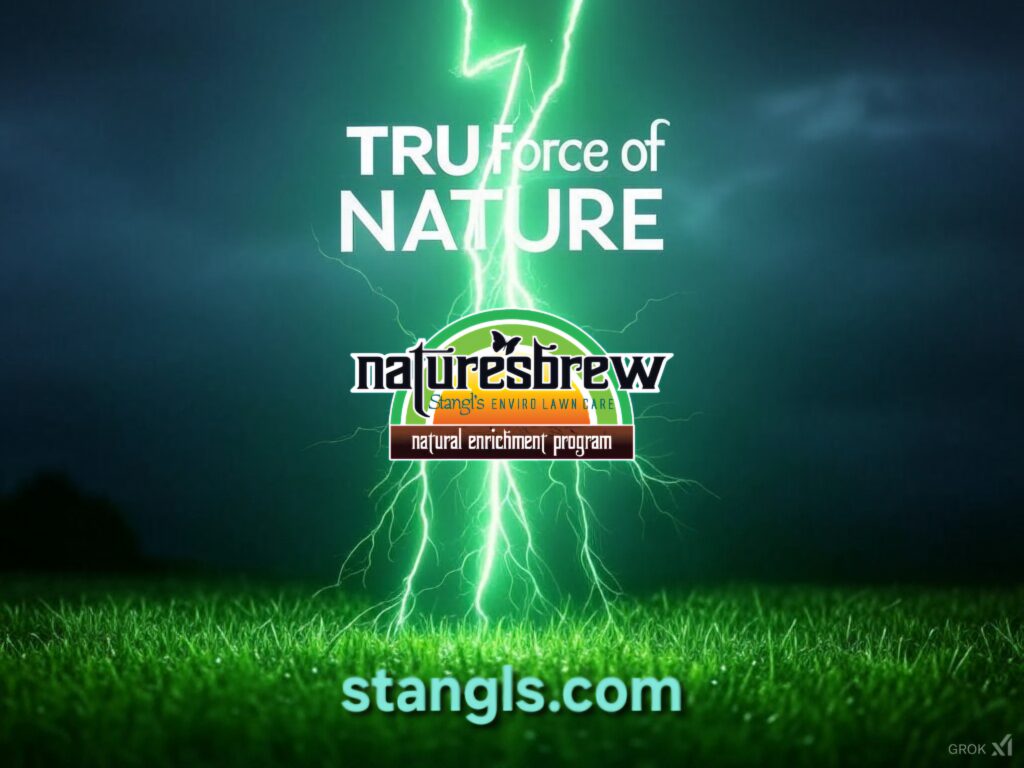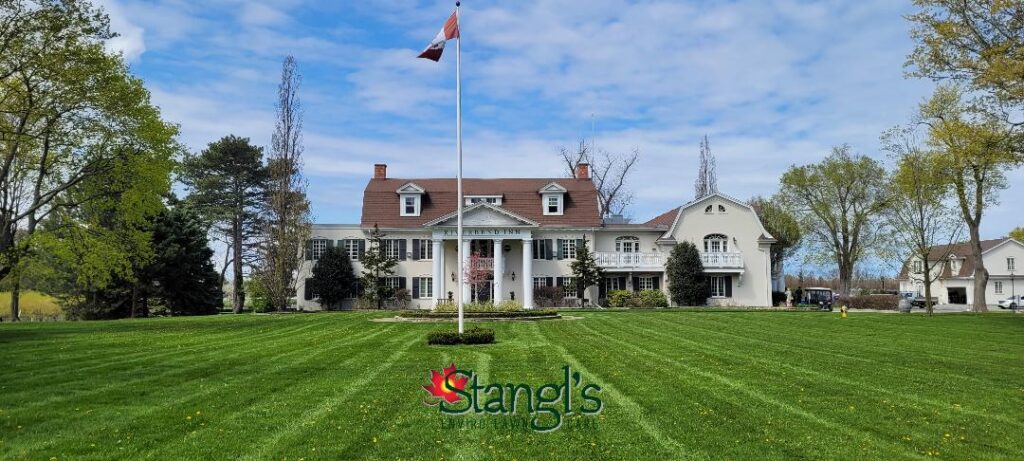
At Stangl’s Enviro Lawn Care, we believe that healthy lawns start with healthy soil—and healthy soil starts with understanding living systems. For over 44 years, we’ve worked to transform lawns, sports fields, vineyards, and farms in the Niagara Region into thriving ecosystems using regenerative, 100% organic methods. Our flagship product, Nature’s Brew, is a testament to the power of working with nature, not against it. In this post, we’ll explore what living systems are, how we harness them to regenerate soil and plants, and why our approach benefits not only the environment but also the people who apply it—like us and our clients.
What Are Living Systems?
Living systems are the intricate, interconnected networks of organisms—plants, microbes, fungi, and more—that work together to sustain life. Think of a rainforest: a complex web of roots, microbes, insects, and animals, all interacting to create a stable, resilient ecosystem. In contrast, conventional lawn care often mirrors a monoculture, relying on chemical inputs that disrupt these natural relationships, leading to unstable soils and unhealthy plants.
As John Kempf and Robert Kirk discussed on the Regen of Agriculture podcast, modern agriculture and lawn care have strayed from nature’s blueprint. By focusing on single-factor solutions—like synthetic fertilizers or pesticides—we’ve ignored the complexity of living systems. At Stangl’s, we take a different approach, inspired by nature’s wisdom. Our goal is to mimic these systems, fostering biodiversity and resilience in every lawn we touch.
How We Work with Living Systems
Our approach is rooted in regenerative principles, prioritizing soil health as the foundation for vibrant lawns. Here’s how we work with living systems to achieve this:

- Leveraging Microbial Power with Nature’s Brew: Our signature product, Nature’s Brew, is a specialized blend of bacteria, fungi, and other living organisms, crafted from Johnson-Su compost extract and rigorously tested for microbial diversity. Applied seven times a year (April to October), it introduces a thriving microbial community to the soil, enhancing nutrient cycling, water retention, and plant resilience. These microbes engage in processes like the rhizophagy cycle, where plants internalize bacteria to extract nutrients, boosting growth without synthetic fertilizers. DNA testing confirms that Nature’s Brew contains a diverse microbial consortium, including species like arbuscular mycorrhizal fungi and Trichoderma, which suppress pathogens and fix carbon. This mirrors the podcast’s call to mimic natural ecosystems, like rainforests, for stability and reduced chemical inputs.
- Optimizing Plant Health Through Epigenetics: Living systems don’t just respond to their environment—they adapt. Plants adjust their gene expression (epigenetics) based on soil conditions, microbial interactions, and stressors. Nature’s Brew enhances these adaptations by creating a nutrient-rich, microbially active soil environment, encouraging plants to produce natural defenses like secondary metabolites (e.g., tannins, salvestrols). These compounds deter pests and pathogens, reducing the need for toxic sprays.For example, our work with Niagara vineyards and sports fields, like Saint Michael Catholic High School, shows how healthy soils lead to robust plants that thrive under local conditions—without the chemical crutches that Robert Kirk warned can disrupt ecosystems and human health.
- Restoring Soil as a Living Ecosystem: Soil is not just dirt—it’s a living system teeming with billions of organisms. Conventional lawn care, with its heavy reliance on synthetic fertilizers and pesticides, often kills these beneficial microbes, leading to compacted, lifeless soil. Nature’s Brew rebuilds this ecosystem by improving soil structure, increasing organic matter, and reducing water needs. Our clients see lush, green lawns that require less maintenance and fewer inputs, proving that working with living systems is both effective and sustainable.
The Ripple Effect: Plants, Soil, Environment, and Applicator
The beauty of working with living systems is that the benefits extend far beyond the lawn. Every application of Nature’s Brew creates a ripple effect, impacting plants, soil, the environment, and even the applicator in profound ways:
- Plants:
- Healthier plants with stronger roots and natural pest resistance, thanks to microbial support and epigenetic adaptations.
- Reduced reliance on chemical fertilizers and pesticides, aligning with Kirk’s critique of single-mode-of-action solutions that destabilize ecosystems.
- Soil:
- Enhanced microbial diversity and soil structure, leading to better water retention and nutrient availability. Our DNA testing shows Nature’s Brew fosters a balanced microbial community, akin to a thriving forest floor.
- Increased carbon sequestration, contributing to climate resilience—a key concern raised in the podcast about undervaluing natural resources like soil.
- Environment:
- By eliminating synthetic chemicals, we protect local waterways, wildlife, and biodiversity, addressing Kirk’s warnings about chronic pesticide exposure and its multi-generational impacts.
- Our regenerative approach supports pollinators and soil organisms, fostering ecosystems that are resilient to stressors like drought or pests.
- The Applicator:
- As applicators, we at Stangl’s experience the joy of working with safe, organic products. Unlike conventional lawn care, which requires warning signs and protective gear, Nature’s Brew poses no risk to us, our families, or our clients’ pets and kids. This aligns with the podcast’s emphasis on human health, as chemical exposure can lead to chronic health issues, as seen in studies like Serelini’s on glyphosate’s multi-generational effects.
- Working with living systems is also deeply fulfilling. Watching a struggling lawn transform into a vibrant, low-maintenance ecosystem is a testament to the power of regeneration. It’s not just a job—it’s a mission to heal the land and inspire others.
Why It Matters: A Call to Action
The Regen of Agriculture podcast highlighted a critical window of opportunity, with initiatives like the MAHA Commission pushing for transparency and healthier systems. At Stangl’s, we’re part of this movement, challenging the chemical-heavy status quo of lawn care. But we can’t do it alone. Here’s how you can join us in working with living systems:
- Choose Regenerative Lawn Care: Opt for services like ours that prioritize soil health and chemical-free solutions. Your lawn will thank you, and so will the planet.
- Educate Yourself: Seek out independent information about the impacts of pesticides and the benefits of regenerative practices. As Kirk noted, the “war of information” often obscures the truth—don’t settle for selective data from corporate sources.
- Support Local Ecosystems: Whether you’re a homeowner, farmer, or business owner, consider how your choices impact soil, water, and biodiversity. Small steps, like reducing chemical use or planting native species, make a big difference.
- Spread the Word: Share our story and the regenerative revolution with your community. Follow us on social media (#NaturesBrew, #LivingSoil, #RegenRevolution) to stay updated on our work and upcoming innovations like Plasma Fertilizer (coming in 2025).
Looking Ahead: The Future of Living Systems
As we continue to refine Nature’s Brew and explore new tools like Plasma Fertilizer, we’re committed to deepening our understanding of living systems. Our DNA testing and partnerships with experts like Dr. James White and Glen Ravenberg ensure that our methods are grounded in science and nature. We’re not just growing lawns—we’re regenerating ecosystems, one yard at a time.
Join us in embracing living systems to create healthier lawns, soils, and communities. Together, we can build a future where nature is our teacher, and regeneration is our legacy.
Ready to transform your lawn with living systems? Contact us at Stangl’s Enviro Lawn Care to learn more about Nature’s Brew and our regenerative services. Visit www.stangls.com or call us today!
